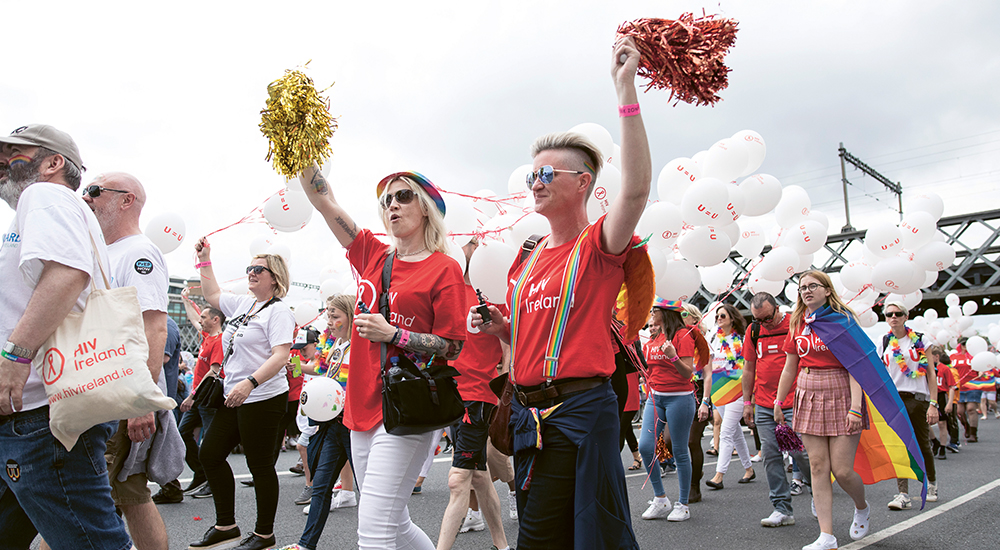We are teaming up with BeLonG To Youth Services for #VoteWithPride Hustings – which will be streamed on Facebook, February 4 from 7 pm. We are inviting representatives from political parties to join us & answer questions about what matters to us as a community.
Ahead of this, we are running a series over the next week to highlight what specific groups within our community will be asking for.
If you would like to add your voice to the #VoteWithPride conversation please send us your questions for candidates to [email protected] and tune in on February 4.
Yesterday we featured LGBT Ireland’s asks from candidates and today we are highlighting the HIV Ireland manifesto for the General Election 2020.
The HIV Ireland manifesto was originally published in GCN Issue 362. Read now.
Press Release: #HIVIreland publishes #HIVManifesto and invites all #GE2020 candidates to voice their support to end new #HIV transmissions, combat #stigma and improve services for people living with HIV in #Ireland. https://t.co/VtXRCsaHct @SOHare75 pic.twitter.com/19n4aesFBe
— HIV Ireland (@HIVIreland) January 23, 2020
HIV Ireland has detailed in their manifesto their asks for all GE 2020 candidates:
1. Deliver on the commitment to end new HIV transmissions by 2030.
In 2019, the Irish Government stated publicly its commitment to ending new transmissions of HIV in Ireland in line with the global Fast-Track Cities initiative and the UN Sustainable Development Goals. Currently, Ireland lags behind other EU Members States in ensuring 90 per cent of people living with HIV know their HIV status, 90 per cent of those are on effective treatment and 90 per cent on effective treatment reach an undetectable viral load, meaning they cannot pass on HIV through sexual intercourse.
2. Develop and deliver a new National Sexual Health Strategy.
An updated National Sexual Health Strategy for Ireland should include measures to improve access to HIV and sexual health services, and commitments to reach global targets for the reduction of HIV transmission. Increased investment at the intersection of existing strategic priorities on sexual health, mental health and addiction should also be made.
3. Deliver on the Fast-Track Cities target to achieve zero HIV-related stigma and discrimination.
A commitment to end the stigma and discrimination associated with HIV was made when Ireland signed up to the Fast-Track Cities initiative. Strategies to combat stigma and discrimination should include resourcing a national U=U (undetectable equals untransmittable) campaign, public education initiatives and targeted awareness-raising measures.
4. Invest in public health and fully fund HIV services to meet the needs of all communities.
The availability of HIV testing is failing to meet current demand. Barriers to accessing PrEP (Pre-Exposure Prophylaxis) reduce the impact of national HIV prevention programmes particularly among vulnerable populations (sex workers; undocumented migrants; people seeking asylum). There is also a pressing need to develop longer-term health and social care services aimed at older people living with HIV.
5. Deliver on the statutory commitment to review the legislation that criminalises the purchase of sex.
The impact of Criminal Law (Sexual Offences) Act 2017 on “persons who engage in sexual activity for payment” is expected in 2020. Consideration of the impact of the existing law on sex workers should include references to its negative impact on sexual and reproductive health, increased vulnerability of sex workers to HIV, and increased vulnerability to violence and abuse.
6. Develop and resource early harm reduction interventions for those engaged in chem sex.
The popularity of more potent drugs for use in chemsex, particularly among gay and bisexual men and men who have sex with men, is leading to an increase in related harms, addiction issues and unprotected sex among users. Measures to strengthen early harm reduction responses to emerging trends and patterns of drug use should be adopted.
7. End the discriminatory 12-month deferral period on blood donations for gay, bisexual and men who have sex with men.
The best available scientific evidence and advances in testing technology mean that the current 12-month deferral period imposed on gay, bisexual and men who have sex with men exceeds what is required to maintain the safety of the blood supply. Efforts must be made to remove the current discriminatory practice and replace it with an evidence-based individual risk assessment for all blood donors.
8. Resource locally-accessible peer support services for people living with HIV.
The number of people living with HIV in Ireland is estimated to be between 8,000 and 10,000. The provision of locally accessible peer support services run by and for people with lived experience of HIV, particularly for those who are newly diagnosed, allows people to benefit from physical, emotional and practical supports.
© 2020 GCN (Gay Community News). All rights reserved.
Support GCN
GCN is a free, vital resource for Ireland’s LGBTQ+ community since 1988.
GCN is a trading name of National LGBT Federation CLG, a registered charity - Charity Number: 20034580.
GCN relies on the generous support of the community and allies to sustain the crucial work that we do. Producing GCN is costly, and, in an industry which has been hugely impacted by rising costs, we need your support to help sustain and grow this vital resource.
Supporting GCN for as little as €1.99 per month will help us continue our work as Ireland’s free, independent LGBTQ+ media.
